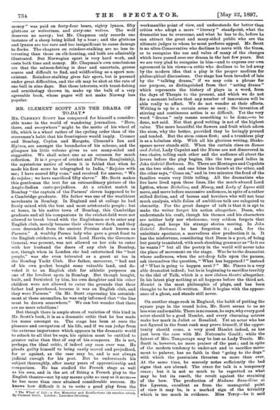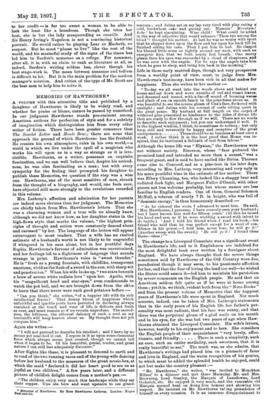MR. CLEMENT SCOTT AND THE DRAMA OF TO-DAY.*
MR. CLEMENT SCOTT has conquered for himself a consider- able name in the world of wandering journalism. " Here, there, and everywhere" might be the motto of his wheel of life, which is a wheel rather of the cycling order than of the steersman's habit that his frontispiece would imply. Cromer and Bombay, Ceylon and Margate, Clement's Inn and Hyeres, are amongst the boundaries of his scheme, and the glimpses his little volume gives us are many-sided and suggestive. We shall select one as an occasion for much reflection. It is a propos of cricket and Prince Ranjitsinhji, the mysterious native of whom it is fabled that when he made his first score he telegraphed to India, " Rejoice with me ; I have scored fifty runs." and received for answer, " We do rejoice ; we have sacrificed fifty slaves." Mr. Scott makes this gentleman the text for an extraordinary picture of the Anglo-Indian caste-prejudices. At a cricket match in Bombay "the captain of the Parsees' eleven happened to be a Cambridge graduate. His father was one of the wealthiest merchants in Bombay. In England and at college he had freely mixed with the best and most aristocratic people : but at home, in his native town of Bombay, this Cambridge graduate and all his companions in the cricket-field were not allowed to break bread with the Englishmen or to enter any English club, merely because their skins were dark, and they were descended from the ancient Persian stock known as Parsees." A wealthy Parsee lady who gave a great feast to the English cricketers, at which Lord Harris, the Governor- General, was present, was not allowed on her side to enter with her husband the doors of any club in Bombay, nor, though when in London she had entertained the " best people," was she even tolerated as a guest at tea in the Bombay Yacht Club. Her father, moreover, " had out of his own pocket bought some valuable land, and de- voted it to an English club for athletic purposes on one of the loveliest spots in Bombay. But though bought, built, and furnished by him, his own daughter and his other children were not allowed to enter the grounds that their father had purchased, because it was an English club, and they were Parsees." On Mr. Scott expressing his astonish- ment at these anomalies, he was only informed that " the line must be drawn somewhere." We can but wonder that there are no more rebellions !
But though there is ample store of varieties of this kind in Mr. Scott's book, it is as a dramatic critic that he has made his name amongst us. The stage has been at once the pleasure and occupation of his life, and if we can judge from the extreme importance which appears in the dramatic world to attach to all that he says, his opinion must be entitled to greater value than that of any of his compeers. He is not, perhaps, the ideal critic, if indeed any man ever was. He pleads guilty himself to being easily moved and prejudiced, for or against, as the case may be, and is not always judicial enough for his post. But he understands his subject thoroughly, after many years of apprenticeship and comparison. He has studied the French stage as well as bis own, and in the art of fitting a French play to the English theatre—not by any means quite so easy as it seems— he has more than once attained considerable success. He knows how difficult it is to write a good play from the
• The Wheel of Life : a Few Memories and Recollections (de omnibus rebus). By Clement Scott. Loudon : Laurence Greening. workmanlike point of view, and understands far better than critics who adopt a more " literary " standpoint, what the dramatist has to overcome, and what he has to do, before he can attract the great and many-sided public who are the ultimate judges to whom he must perforce appeal. Mr. Scott is no ultra-Conservative who declines to move with the times, or to recognise the use and value of many of the changes which have passed over our drama in the last few years. But we are very glad to recognise in him—and to express our own agreement in his views—a critic who declines to be led away by the modern idea that a play is the proper medium for philosophical discussions. Our stage has been invaded of late by the "talking drama," if we may coin a phrase for our purpose, as distinguished from that " acting drama" which represents the history of plays in a word, from the days of Thespis to the present, and which we do not for a moment believe that any number of innovators will be able really to affect. We do not wonder at their efforts. Writing is up to a certain sense so easy ; the invention of stirring and continuous action is so difficult. Yet the very word " drama " only means something to be done,—to be done, not said. Not that good writing is not of the highest value. The more beautiful the flowers and fruit which adorn the stem, why the better, provided they be lovingly pruned and tended. But the stem comes first; and a trunkless play is as a helmless ship. With all his glorious writing, Shake- speare never stands still. When the curtain rises on Romeo and Juliet, Lady Capulet and the Nurse are not discovered in two chairs, telling each other and the audience all about the lovers before the play begins, like the two good ladies in John Gabriel Borkman. No. There are Montague and Capulets on the two sides; and one bites his thumb at the other, and the other says," Come on," and in two minutes the fend of the families wants very little telling. All the dramatists who live have lived upon these lines, like the much-abused Lord Lytton, whose Richelieu, and Money, and Lady of Lyons still move, and move before successive audiences, in spite of a rather stilted diction, and of heroes and heroines who will not bear much analysis, while folios of ambitious talk are relegated to obscurity. For the great danger of talk is that it is apt to make the writer forget his action altogether. Ibsen, who understands his craft, though his themes and his characters are neither holy nor wholesome, very seldom forgets that danger, and keeps his strange stories moving. In John Gabriel Borkman he has forgotten it ; and, for the uninitiate spectator, a marvellous slow production it is. It has the misfortune, considering that Ibsen is a poet, of being but poorly translated, with such shocking grammar as "Is it me he wants ? " but all the poetry in the world will never take the place of movement on the stage. Woe be to the dramatist whose audiences, when the act-drop falls upon the pauses, ask themselves the question, " What has happened ?" instead of " What is going to happen next ? " Mr. Pinero is a very able dramatist indeed; but he is beginning to sacrifice terribly to the idol of Talk, which is a new idolum theatri altogether. In his latest play nothing at all happens before the third act. Hamlet is the most philosophic of plays, and has been thought to be not ill-written. But it begins with the appear- ance of a ghost, and stands still never.
On another stage-rock in England, the habit of putting the square pegs in the round holes, Mr. Scott seems to ns no less wise and sensible. There is no reason, he says, why every good actor should be a good Hamlet, and every charming actress make her mark in Juliet or Rosalind. Yet an actor who has not figured in the front rank may prove himself, if the oppor- tunity should come, a very good Hamlet indeed, as has just been the case with Mr. Nutcombe Gould ; while the fairest of Mrs. Tanquerays may be lost as Lady Teazle. Mr. Scott is, however, no mere praiser of the past ; and in spite of the modern tendency to under-act and to sacrifice move- ment to palaver, has no faith in that "going to the dogs" with which the pessimists threaten us more than ever. At the same time, he scarcely notes sufficiently the bad signs that are abroad. The craze for talk is a temporary craze ; but it is not so much to be regretted as what may be but its result, the revolt against the straining of the bow. The production of Madame Sans-Gene at the Lyceum, excellent as from the managerial point of view it may be, is a marked sign of the triviality which is too much in evidence. Miss Terry—be it said to her credit — is far too sweet a woman to be able to look the least like a laundress. Though she tries her best, she is but the lady masquerading as canaille. And Sir Henry Irving's Napoleon is not a convincing historical portrait. He would rather be playing Lear or Macbeth, we suspect. But he must "please to live" like the rest of the world, and his masterful study of the signs of the times has led him to Sardou's nonsense as a refuge. For nonsense, after all, it is, with no claim to rank as literature at all, as indeed, Sardou's writing seldom has, clever though his best stage-work is. The mean between nonsense and tedium is difficult to hit. But it is the main problem for the modern manager's solution. And critics of the type of Mr. Scott are the best men to help him to solve it.







































 Previous page
Previous page